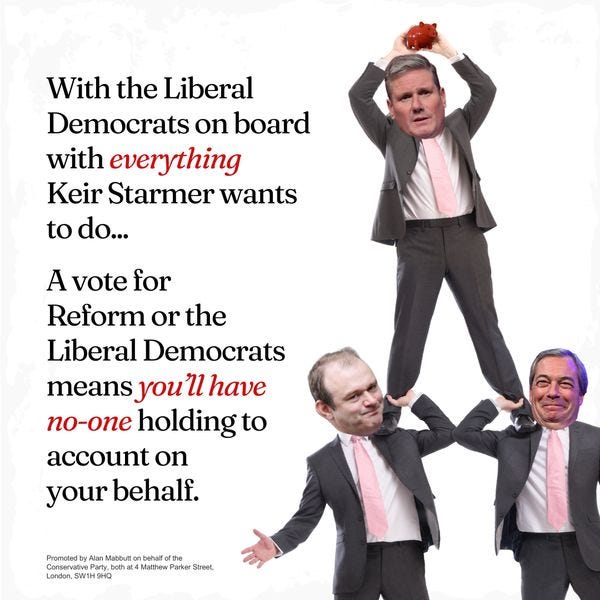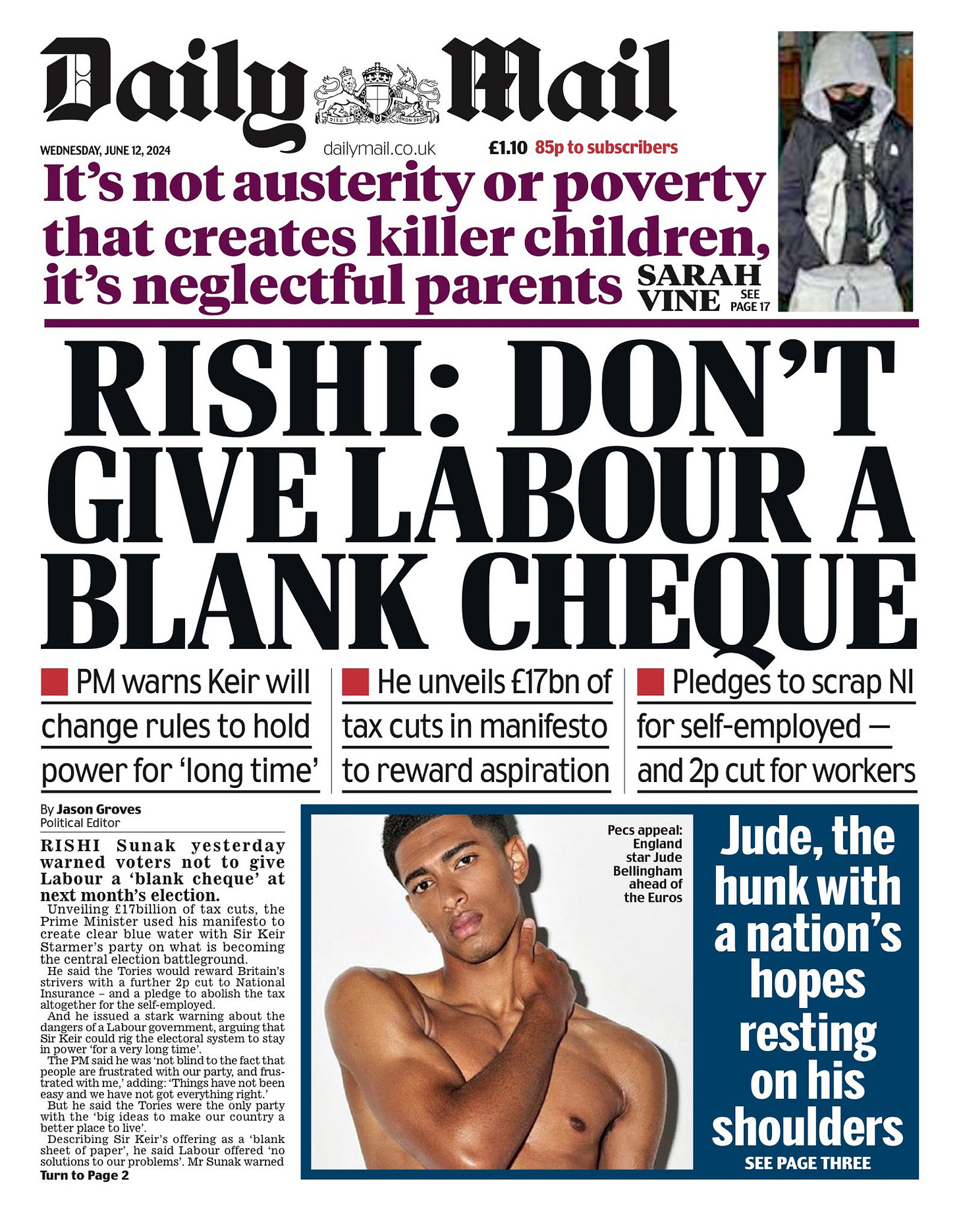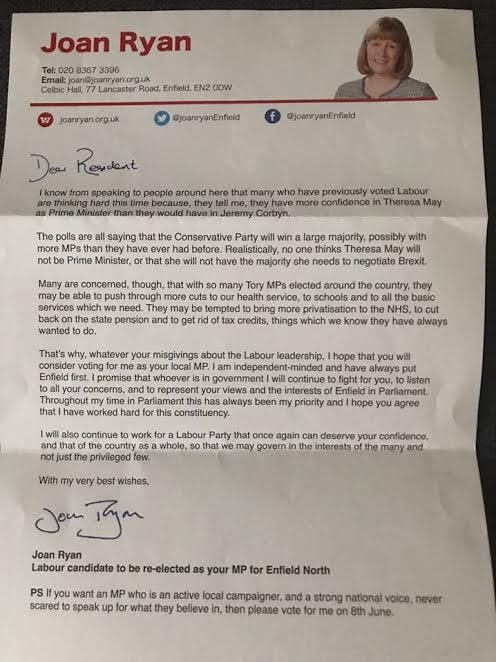Bar charts and blank cheques
Telling people you can win versus telling people you're going to lose
The dodgy Lib Dem bar chart is one of the staple clichés of UK election campaigns: find a way of presenting a poll or a recent election result that implies that ONLY THE LIBERAL DEMOCRATS CAN BEAT THE TORIES HERE or that IT’S A TWO-HORSE RACE, even if that presentation is really quite misleading. Here, for example, is a graphic from a Lib Dem leaflet from 2019, in the Bristol North West constituency, based on a single poll.
In the event, Labour won that seat, and the Lib Dems came a poor third, with 8.8% of the vote. Some people get very angry about how misleading this can be, and I take their point,1 but I mostly find it funny.
The point of telling voters that you are in a position to win if only they vote for you, of course, is to persuade people to do just that, and help you win. It is a fairly conventional approach. This week, the Conservatives are adopting a different strategy. Here’s a still from an ad they are running on Facebook.
Yes, that does show what you think it shows: a massive Labour majority with the Tories coming third to the Lib Dems and getting less than 20% of the vote, and with Reform not winning any seats even if you vote for them (so don’t vote for them, vote for us instead, please, seriously, please, vote for us instead). There’s a real basis in recent polling for this graphic - it is more credible than some Lib Dem bar charts we’ve seen - but still, “Look, we are going to get absolutely creamed” is a pretty punchy topline for a party to be turning to halfway through a general election campaign.
It is more normal for losing parties to go with “OK I know the polls are bad but don’t give up, actually we’ve got a chance if you stick with us” than with “The polls are so bad that we face an existential threat, but you can maybe help us come second”. But sometimes parties do need to find ways of holding the line, not to stop defeat entirely but to stop the defeat being too heavy. Part of that is just asking people to vote for them, for the same reasons they always ask people to vote for them, but some of it is about appealing to people who might not mind the other side winning, but really don’t want them to win by too much.
That’s what this Conservative Facebook ad is about, too.2 It’s nice to see the red piggy bank making another appearance, by the way, isn’t it? This one has the caption “A vote for the Lib Dems or Reform will hand Keir Starmer a blank cheque 🐖”, complete with its own pig emoji, although the pig is pink not red and the caption has nothing to do with pigs and so I don’t know what’s supposed to be going on here.
Most of the Conservative ads on Facebook have different text: “If you vote Reform, Labour or Liberal Democrat, you’ll hand Keir Starmer a massive majority and pay the price”.3 Of course, people who are voting Reform, people who are voting Labour and people who are voting Liberal Democrat may well have relatively little in common in terms of policy preferences, and the main thing they share is that they are trying to kick the Tories out, which means that telling them that they are going to kick the Tories out may have limited value.
The “no blank cheque” message is on the front page of the Daily Mail too, which is a pretty extraordinary splash for a pro-Tory paper on the day after the Tory manifesto launch.
This is a pure damage-limitation exercise, with no serious attempt to suggest that a Conservative win is on the cards at all.
That’s fair enough, given that it probably isn’t. See for example this Bloomberg interview with Chancellor Jeremy Hunt, facing a strong challenge from the Lib Dems (IT’S A TWO-HORSE RACE!) in Godalming & Ash, in which he says that “There’s all to play for” and “This seat is probably going to be won or lost by the Conservatives by 1,500 votes or fewer”. Now, maybe Hunt will hold on - but if the Tories’ best-case scenario is that they win Godalming & Ash by 1,500 votes, which is their own Chancellor’s public line, then their own Chancellor’s public line is that the Tories are going to lose the general election badly.
Damage-limitation exercises are not new. The Conservatives have a history, in elections where they look like losing, of focusing on how nice it would be for their opponents not to get the landslide victory they expect rather than on how nice it would be to get a Conservative government. Look at this one from 2001, for example.
This is an ad based on a simple insight: Labour are going to win. This one from 2005 feels very similar.4
There was also a cinema ad on the same theme, with a song by Andrew Lloyd-Webber (“Take That Look Off Your Face”).5
Labour won both of those elections, although to be fair the Tories weren’t wiped out in either of them and in 2005 they made some actual progress.
Labour has made similar arguments in the past, although not often as a central campaign message, and not always sanctioned by the national leadership. For example, this 2017 letter to constituents by Labour’s Joan Ryan warned that Theresa May was on the verge of a large majority, but that Labour MPs would be needed to provide a strong opposition.
Of course, May didn’t get her large majority, or even a majority at all, although saying “Well, that shows messages like this worked then” is a good way of starting an argument you might already be tired of.
The “OK fine they’re going to win but don’t give Labour a massive landslide and please do leave us with at least a few Conservative MPs” message does rely on people thinking that they don’t want to see a massive Labour landslide, and that they’d like to see at least a few Conservative MPs. That might not be where many people are.
My Public First colleagues6 have just conducted a poll to find out what the public actually thinks about the scenario the Conservatives are warning about, and the results are… very funny. It turns out that 46% of people, including 24% of people who voted Conservative in 2019, agree with the statement “The Conservatives deserve to lose every seat they have”. That is an extraordinary appetite for total Conservative wipeout, including from a very substantial proportion of recent Conservative voters.
Another question in the same poll found that 36% of voters agreed with the statement “I would like to see the Conservatives lose all their seats at the election” and that a further 22% agreed with the statement “I would like to see the Conservatives lose the election, but I would still like them to have at least some seats”. Just 16% agreed with the statement “I would like to see the Conservatives win the election”. This is not a strong basis on which to fight a successful election campaign. Here’s a bar chart.
You can read a full discussion of the findings, including some other poll questions around the same topic, in this blog post by my colleague Seb Wride, and it was also covered, perhaps through gritted teeth, by the Telegraph here.
As it stands, we face an election where the Conservatives’ argument is “We’re going to get wiped out” and the electorate’s response is “Good”. It’s difficult to construct a persuasive bar chart out of that.
While I’m promoting work stuff, I did some work on another poll this week, asking whether the public could identify which policies belong to which party. My colleague Tommy Gale and I wrote a blog about the findings here: there are some quite fun ones, including the fact that 50% of people think that the Green Party’s policy of a wealth tax on assets over £10 million is a Labour policy, 14% think it is a Conservative policy and just 10% think it is a Green policy, and that the public thinks all NHS policies are Labour policies whoever is actually advocating them.
My dad once voted Lib Dem as a result of a convincing Lib Dem claim that only they could beat the Tories where he lived, and he was very annoyed when the Tories won with the Lib Dems coming a distant third, although to be fair I’ve just checked what happened in that seat at that election and Labour came a pretty distant second, so it wouldn’t have made any difference anyway.
They’ve managed to leave the word “Labour” out of the second sentence, somehow. This is not a campaign that is doing the basics well.
The captions do vary a bit. Some of them just say “If you vote Labour, you’ll hand Keir Starmer a massive majority and pay the price”, which seems to me to underestimate the extent to which people who vote Labour in particular may want Labour to win.
This is the best quality image of this ad that I can find, and I freely admit that it is absolutely terrible. The caption from the article I found it in describes it as “A 3D Conservative election poster” and I have to confess to not understanding quite what that involved. Maybe 2005 was a long time ago after all.
The video also had an absolutely deranged launch quote by then-Conservative Co-Chairman Dr Liam Fox: “Tony Blair is Britain’s first karaoke politician. When he first became Prime Minister, music and lyrics seemed to be in synch. And for some while, he sounded quite convincing. People even thought that he might be the real thing. What this election campaign has conclusively proved is that the suspension of disbelief is well and truly over”.
I don’t usually promote work stuff on this Substack, which raises the question: Tom, are you an idiot? Of course you should promote work stuff on this Substack.











